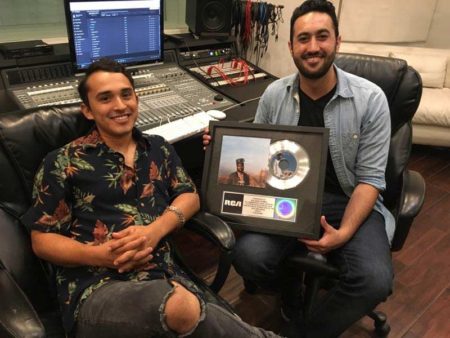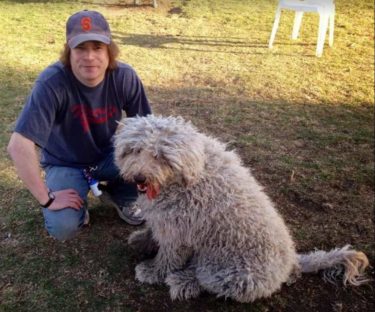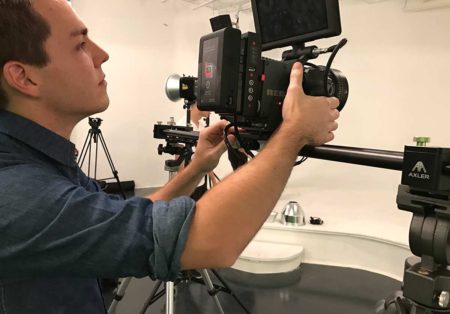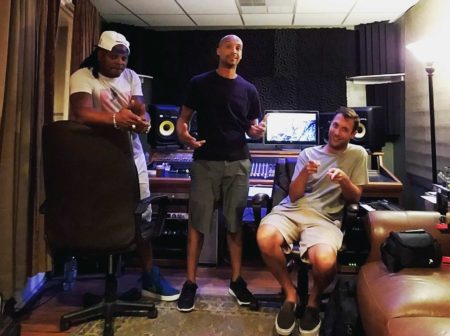Please fill out the following information, and RRFC Admissions will contact you to discuss our program offerings:
Issue #188
by L. Swift and Jeff McQ
 When you learn the music industry from inside it, you get opportunities you won’t get anywhere else. Within months of starting his apprenticeship at Beacon Hill Recording Studios in El Paso, Texas, Recording Connection grad Robert Macias has landed an Assistant Engineering credit on a Platinum selling album—namely, American Teen by pop/R&B sensation Khalid, winner of MTV’s Best New Artist VMA 2017!
Ever since deciding he wanted to develop as a musical artist in his teens, Robert has had a common-sense view about preparing himself for the industry—which is what initially led him to the Recording Connection.
“I really got into the program because I have a firm belief that the future artist is going to be…fluent in all areas of the business—the creative, the technical, and the business side,” he says. “So I wanted to jump into the technical side and learn about it as much as I can, and just add that to my skill set.”
Given Beacon Hill’s rising reputation as a world-class studio in the El Paso area, Robert admits that he was sent to the recording studio for his initial apprenticeship interview, he was a bit overwhelmed.
“It was very scary for me,” he says, “because I was like, ‘Man, these guys are so cool, these guys are so big.’ I was just nervous, but then it got to me and I was like, ‘No, wait. I’ve got to shoot for the stars.’”
Robert soon found himself immersed in studio life and all the tasks it entails, and says it really helped him up his game in many ways. “I know myself in the sense that hands-on work is the best type of training,” he says, “because when you’re working in the field so to say, you’re not just learning it in theory. You’re learning it hands-on, therefore you’re learning so much, your mind is registering so much more while it’s building a skill set, while you’re building muscle memory of what you’re doing…Of course, it wasn’t just like, ‘I’m going to throw you to the lions to figure it out for yourself,’ but sometimes it was the pressure that allowed you to push through and learn to get through those obstacles.”
The opportunity to work with Khalid on American Teen came while Robert was studying as an apprentice under mentor Alfredo Gonzales, alongside fellow grad and now-staff engineer Orlando Gomez, whom we recently featured here.
“Khalid’s a freaking genius,” says Robert. “It also uplifts you because you’re in this inner circle of successful people, so you can also borrow from what they have to say or from what you can pick out of their brain.”
Because he worked in sessions with Khalid as part of his training, and because his mentor Alfredo believes in sharing the credit, Robert earned an Assistant Engineering credit on the record, which has since gone Platinum. “I was into half of the course when that happened,” he says. “I’m honestly really lucky because I know that this credit doesn’t happen to everybody.”
As for broadening his skill set, the Recording Connection program has gone well beyond Robert’s initial expectations. Not only has he learned the technical side of things as we wanted, but he’s also learned about the business side, picking up morsels of wisdom that can help him to develop his presence as an artist in his own right.
“When I get to go out to eat with Orlando or Alfredo,” he says, “they’ll start talking about just different lucrative ideas on how to make the artists money, because CD sales aren’t what they used to be. So it’s all about giving your listener an experience…what kind of content to put out as an artist, and how to get noticed, how to network with different YouTubers and try to monetize your music, copyright your music, become part of a performance rights organization. There’s a lot more that goes into an artist’s sales funnel than just good recording, and to their success. So a lot of that is being brought to my attention, so I’m learning what’s a performance rights organization, which one’s better, BMI, ASCAP? Do the research. What is CD Baby? How do I get music on Spotify, iTunes, Amazon? Things like that.”
Even better, as he learns in a true mentoring environment, Robert says he’s become part of the studio community. “Orlando, he’s going to become a life friend for me,” he says. “The vibes at the studio are nothing but love and nothing but openness for creating and acceptance…Being at Beacon Hill has helped me so much. It’s helped me develop as an artist, it’s helped me develop as a person also, even maturing myself as a person, having nothing to do with the technical or artistic side. It’s really helped me develop as a person and become more focused in understanding where I want to go and what I want to do.”
When you learn the music industry from inside it, you get opportunities you won’t get anywhere else. Within months of starting his apprenticeship at Beacon Hill Recording Studios in El Paso, Texas, Recording Connection grad Robert Macias has landed an Assistant Engineering credit on a Platinum selling album—namely, American Teen by pop/R&B sensation Khalid, winner of MTV’s Best New Artist VMA 2017!
Ever since deciding he wanted to develop as a musical artist in his teens, Robert has had a common-sense view about preparing himself for the industry—which is what initially led him to the Recording Connection.
“I really got into the program because I have a firm belief that the future artist is going to be…fluent in all areas of the business—the creative, the technical, and the business side,” he says. “So I wanted to jump into the technical side and learn about it as much as I can, and just add that to my skill set.”
Given Beacon Hill’s rising reputation as a world-class studio in the El Paso area, Robert admits that he was sent to the recording studio for his initial apprenticeship interview, he was a bit overwhelmed.
“It was very scary for me,” he says, “because I was like, ‘Man, these guys are so cool, these guys are so big.’ I was just nervous, but then it got to me and I was like, ‘No, wait. I’ve got to shoot for the stars.’”
Robert soon found himself immersed in studio life and all the tasks it entails, and says it really helped him up his game in many ways. “I know myself in the sense that hands-on work is the best type of training,” he says, “because when you’re working in the field so to say, you’re not just learning it in theory. You’re learning it hands-on, therefore you’re learning so much, your mind is registering so much more while it’s building a skill set, while you’re building muscle memory of what you’re doing…Of course, it wasn’t just like, ‘I’m going to throw you to the lions to figure it out for yourself,’ but sometimes it was the pressure that allowed you to push through and learn to get through those obstacles.”
The opportunity to work with Khalid on American Teen came while Robert was studying as an apprentice under mentor Alfredo Gonzales, alongside fellow grad and now-staff engineer Orlando Gomez, whom we recently featured here.
“Khalid’s a freaking genius,” says Robert. “It also uplifts you because you’re in this inner circle of successful people, so you can also borrow from what they have to say or from what you can pick out of their brain.”
Because he worked in sessions with Khalid as part of his training, and because his mentor Alfredo believes in sharing the credit, Robert earned an Assistant Engineering credit on the record, which has since gone Platinum. “I was into half of the course when that happened,” he says. “I’m honestly really lucky because I know that this credit doesn’t happen to everybody.”
As for broadening his skill set, the Recording Connection program has gone well beyond Robert’s initial expectations. Not only has he learned the technical side of things as we wanted, but he’s also learned about the business side, picking up morsels of wisdom that can help him to develop his presence as an artist in his own right.
“When I get to go out to eat with Orlando or Alfredo,” he says, “they’ll start talking about just different lucrative ideas on how to make the artists money, because CD sales aren’t what they used to be. So it’s all about giving your listener an experience…what kind of content to put out as an artist, and how to get noticed, how to network with different YouTubers and try to monetize your music, copyright your music, become part of a performance rights organization. There’s a lot more that goes into an artist’s sales funnel than just good recording, and to their success. So a lot of that is being brought to my attention, so I’m learning what’s a performance rights organization, which one’s better, BMI, ASCAP? Do the research. What is CD Baby? How do I get music on Spotify, iTunes, Amazon? Things like that.”
Even better, as he learns in a true mentoring environment, Robert says he’s become part of the studio community. “Orlando, he’s going to become a life friend for me,” he says. “The vibes at the studio are nothing but love and nothing but openness for creating and acceptance…Being at Beacon Hill has helped me so much. It’s helped me develop as an artist, it’s helped me develop as a person also, even maturing myself as a person, having nothing to do with the technical or artistic side. It’s really helped me develop as a person and become more focused in understanding where I want to go and what I want to do.”
 Film Connection screenwriting mentor Eric Abrams (Los Angeles, CA) is no stranger to the Hollywood film and television scene. Over the years, he’s written scripts for films like Crocodile Dundee in Los Angeles, as well as multiple TV shows like Married…with Children and Disney Channel’s Liv & Maddie. He’s also passionate about making sure his screenwriting students understand the structural elements of what makes a good script, and as you’ll see below, he insists on having them create an outline so they don’t lose their way in a 100-or-more-page script.
During a recent conversation with RRFC, Eric offered some practical, tangible advice on scriptwriting that we feel is pure gold for our students. The best nuggets from that conversation have been mined for you below. Enjoy!
Film Connection screenwriting mentor Eric Abrams (Los Angeles, CA) is no stranger to the Hollywood film and television scene. Over the years, he’s written scripts for films like Crocodile Dundee in Los Angeles, as well as multiple TV shows like Married…with Children and Disney Channel’s Liv & Maddie. He’s also passionate about making sure his screenwriting students understand the structural elements of what makes a good script, and as you’ll see below, he insists on having them create an outline so they don’t lose their way in a 100-or-more-page script.
During a recent conversation with RRFC, Eric offered some practical, tangible advice on scriptwriting that we feel is pure gold for our students. The best nuggets from that conversation have been mined for you below. Enjoy!
 After apprenticing with Rehoboth Pictures, recent Film Connection grad Noah Cook (Dallas, TX) isn’t wasting any time. He’s just wrapped his own short film based on a family story:
“My dad had a really weird and interesting childhood, and there was a story he always told me about… I went to South by Southwest…and I saw this short film where it started out with some dudes talking, and then they showed the story. I was like, I really like that. I want to do something like that.”
When asked if he has any advice on how students can make the most of their time in the program, Noah says, “You have to see it as an opportunity…you’re going to get as much out of it as you put in. You’ve been put with this mentor who has access to all these cool toys and spaces and stuff, and you have to get involved, or nothing will happen. If you don’t try everything, you won’t know, especially if you’re trying to figure out what you like. You need to try, like on one project, do sound. On one project do as much camera as they’ll let you, maybe even just shadow the camera guy and, on something else, do some editing. I just think that’s the biggest thing, with Film Connection especially, is just to really apply yourself.”
After apprenticing with Rehoboth Pictures, recent Film Connection grad Noah Cook (Dallas, TX) isn’t wasting any time. He’s just wrapped his own short film based on a family story:
“My dad had a really weird and interesting childhood, and there was a story he always told me about… I went to South by Southwest…and I saw this short film where it started out with some dudes talking, and then they showed the story. I was like, I really like that. I want to do something like that.”
When asked if he has any advice on how students can make the most of their time in the program, Noah says, “You have to see it as an opportunity…you’re going to get as much out of it as you put in. You’ve been put with this mentor who has access to all these cool toys and spaces and stuff, and you have to get involved, or nothing will happen. If you don’t try everything, you won’t know, especially if you’re trying to figure out what you like. You need to try, like on one project, do sound. On one project do as much camera as they’ll let you, maybe even just shadow the camera guy and, on something else, do some editing. I just think that’s the biggest thing, with Film Connection especially, is just to really apply yourself.”

L to R: Artist Saxx, Mike Brown, and RC mentor Jim Fox

RRFC is education upgraded for the 21st century.
Get the latest career advice, insider production tips, and more!
Please fill out the following information, and RRFC Admissions will contact you to discuss our program offerings:
Stay in the Loop: Subscribe for RRFC news & updates!
© 2025 Recording Radio Film Connection & CASA Schools. All Rights Reserved.


